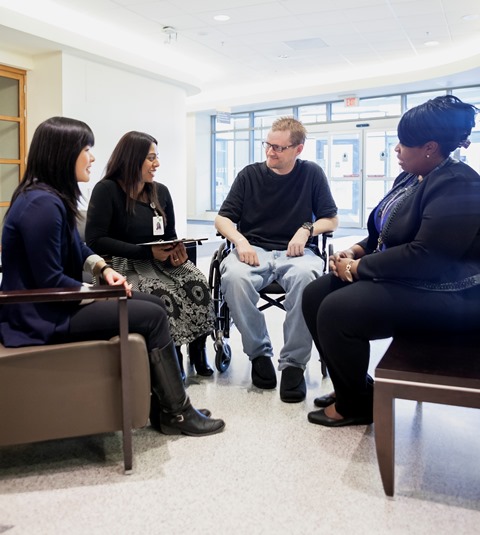
Feelings of stress and emotional suffering are often reported by family members who fulfil the role of caregiver for their loved ones (2012 General Social Survey on Caregiving and Care Receiving). With responsibilities that range from visiting and providing emotional support to assisting with personal care, it is increasingly family caregivers themselves who are struggling and need support. The social work team at Toronto’s Runnymede Healthcare Centre understand the important role that families play in the care of their patients. The team addresses families’ emotional needs so that they can continue to focus on what matters most: their loved one’s health.
Adjusting to new realities after the onset of an illness or a disability is often very stressful – profound anxiety, depression and anger can be common in both patients and families alike. For patients, these feelings can have a negative impact on their quality of life and interfere with their treatment. For family members, stress responses like these can hinder their ability to be supportive at a time when their emotional strength is vital (Ontario Association of Social Workers, 2016).
“Our social work team helps patients and families who are in distress by restoring their coping skills so that they can regain control of their emotions, personal affairs and most importantly, their health,” said Runnymede’s VP of Strategy, Quality and Clinical Programs, Sharleen Ahmed. “Through assessment, diagnosis and therapy, social workers provide patient-centred care while also identifying and addressing the needs of family members.”
Social workers and social service workers are essential points of contact that families have with the hospital’s interprofessional team, providing support through difficult times. “In addition to guiding family members through their anxiety, we also understand that they face additional burdens in the form of grief, regret and guilt,” says Professional Practice Leader, Social Work, Susan McGrail. “We listen to their concerns and provide the reassurance they need, when they need it the most.”
Changes in the health of a loved one are often accompanied by changes in responsibilities within the family. Sometimes, family members can have trouble adjusting to their new caregiving role, especially if the patient has cognitive challenges and needs help with decision-making. In cases like these, legal and financial matters potentially have to be handled before family members are able to fully come to terms with their loved one’s illness or disability.
“Often, family members experience ‘information overload’ and disengage from important decision-making processes,” says McGrail. Navigating legal and financial systems can be overwhelming, but Runnymede’s social work team has expertise in educating families, accessing key resources and providing guidance to inform complex decisions. “Easing families through times like these removes a source of stress and often resolves tensions,” McGrail said.
When patients transition to another level of care and are preparing for discharge from Runnymede, the team again steps in to help support families. “As with many other social systems, understanding how the healthcare system works is often complex for families, so we respond by providing the information they need,” said McGrail. “We help to raise awareness that our hospital is one step on the journey to recovery and that the ultimate goal of the healthcare system is to get patients back into the community.”
By attending to the emotional needs of both patients and their families, Runnymede’s social work team provides much-needed support in times of great vulnerability. “The pressures of caregiving can decrease family members’ abilities to manage not just their own well-being, but the well-being of their loved ones as well,” said Ahmed. “Our social work team is keenly aware of this, and the counselling and educational tools they offer help to move patients and families from what can often be a place of uncertainty and anxiety to one of hope, positivity and independence.”


Comments are closed.